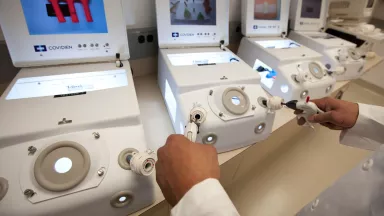Introduction
Our world-renowned orthopedic surgeons and orthopedists are experts in their fields with specialized training to provide the optimal diagnosis and treatment for a range of orthopedic conditions. We are internationally recognized for delivering the highest-quality orthopedic care to our patients.
What is a herniated disc?
The bones (vertebrae) that form the spine in your back are cushioned by small, spongy discs. When these discs are healthy, they act as shock absorbers for the spine and keep it flexible. But when a disc is damaged, it may bulge or break open. This is called a herniated disc. It may also be called a slipped or ruptured disc.
You can have a herniated disc in any part of your spine. But most herniated discs affect the lower back (lumbar spine). Some happen in the neck (cervical spine) and, more rarely, in the upper back (thoracic spine).
What causes a herniated disc?
A herniated disc may be caused by wear and tear of the disc. As you age, your discs dry out and are not as flexible. Injury to the spine may cause tiny tears or cracks in the hard outer layer of the disc. When this happens, the thick gel inside the disc can be forced out through the tears or cracks in the outer layer of the disc. This causes the disc to bulge or break open.
What are the symptoms?
When a herniated disc presses on nerve roots, it can cause pain, numbness and weakness in the area of the body where the nerve travels. A herniated disc in the lower back can cause pain and numbness in the buttock and down the leg. This is called sciatica ("sy-AT-ih-kuh"). Sciatica is the most common symptom of a herniated disc in the lower back. If a herniated disc is not pressing on a nerve, you may have a backache or no pain at all.
How is a herniated disc diagnosed?
Your doctor may diagnose a herniated disc by asking questions about your symptoms and examining you. If your symptoms clearly point to a herniated disc, you may not need tests. Sometimes a doctor will do tests such as an MRI or a CT scan to confirm a herniated disc or rule out other health problems.
How is it treated?
Symptoms of a herniated disc usually get better in a few weeks or months.
To help you recover, rest if you have severe pain. Otherwise, stay active. Staying in bed for more than one or two days can weaken your muscles and make the problem worse. Walking and other light activities may help.
Try using a heating pad on a low or medium setting for 15 to 20 minutes every two to three hours. Try a warm shower in place of one session with the heating pad. You can also buy single-use heat wraps that last up to eight hours. Or try an ice pack for 10 to 15 minutes every two to three hours.
Do the exercises that your doctor or physical therapist suggests. They will help keep your back muscles strong and prevent another injury.
Can a herniated disc be prevented?
After you hurt your back, you are more likely to have back problems in the future. To help keep your back healthy:
- Protect your back when you lift. For example, lift with your legs, not your back. Do not bend forward at the waist when you lift. Bend your knees and squat.
- Use good posture. When you stand or walk, keep your shoulders back and down, your chin back and your belly in. This will help support your lower back.
- Exercise regularly.
- Maintain a healthy weight. This may reduce the load on your lower back.
- Do not smoke. Smoking increases the risk of a disc injury.
Physician Referrals
Montefiore Einstein embraces a collaborative approach.
If you have a patient who could benefit from our services, please reach out.
718-920-2060
Schedule a Visit
Have a general question or concern?
We’re available to help you by phone or email.
• 718-920-2060 • orthofeedback@montefiore.org






